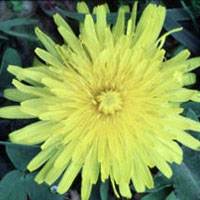Gluten Free
What does following a gluten-free diet mean? That you're embarking on an easy diet with a wide range of health-promoting effects. Instead of dwelling on what you’re giving up, consider that you’re going to enjoy a whole new world of delicious food options to meet your special dietary needs. You’ll be eating seasonally, choosing more fresh fruits and vegetables, focusing on meats, seafood, poultry, legumes, lentils, corn, and rice, and discovering fascinating ancient grains such as quinoa, amaranth, and millet. You’ll be able to eat potatoes, eggs, most cheeses, even chocolate (!)—and enjoy them without guilt because you’ll be taking good care of your body. In fact, you’ll probably end up eating—and feeling—better than ever!
Visit this page for more information about living Gluten Free
---
We carry a large variety of gluten free items, the brands listed below represent just some of the offerings we carry















More Diets
Dandelion
 © Steven Foster
© Steven FosterHow It Works
The primary constituents responsible for dandelion’s action on the digestive system and liver are the bitter principles. Previously referred to as taraxacin, these constituents are sesquiterpene lactones of the eudesmanolide and germacranolide type, and are unique to dandelion.1 Dandelion is also a rich source of vitamins and minerals. The leaves have a high content of vitamin A as well as moderate amounts of vitamin D, vitamin C, various B vitamins, iron, silicon, magnesium, zinc, and manganese.2
An animal study found that at high amounts (2 grams per 2.2 pounds [1 kg] of body weight), the leaves possess diuretic effects comparable to the prescription diuretic furosemide (Lasix®).3 However, to date, these results have not been demonstrated in human clinical trials. Since edema, or water retention, may be a sign of a more serious disease, people should seek the guidance of a physician before using dandelion leaves for either of these conditions.
The bitter compounds in the leaves and root help stimulate digestion and are mild laxatives.4 These bitter principles also increase bile production in the gallbladder and bile flow from the liver.5 For this reason dandelion is recommended by some herbalists for people with sluggish liver function due to alcohol abuse or poor diet. The increase in bile flow may help improve fat (including cholesterol) metabolism in the body.
How to Use It
As a general liver/gallbladder tonic and to stimulate digestion, 1/2–1 teaspoon (3–5 grams) of the dried root or 1–2 teaspoons (5–10 ml) of a tincture made from the root can be used three times per day.6 Some experts recommend the alcohol-based tincture because the bitter principles are more soluble in alcohol.7
As a mild diuretic or appetite stimulant, 1–2 teaspoons (4–10 grams) of dried leaves can be added to a 1 cup (250 ml) of boiling water and drunk as a decoction.8 Or, 1–2 teaspoons (5–10 ml) of fresh juice or 1/2–1 teaspoon (2–5 ml) of tincture made from the leaves can be used three times per day. Fresh dandelion leaves can be eaten as part of a salad.
Copyright © 2025 TraceGains, Inc. All rights reserved.
Learn more about TraceGains, the company.
The information presented by TraceGains is for informational purposes only. It is based on scientific studies (human, animal, or in vitro), clinical experience, or traditional usage as cited in each article. The results reported may not necessarily occur in all individuals. Self-treatment is not recommended for life-threatening conditions that require medical treatment under a doctor's care. For many of the conditions discussed, treatment with prescription or over the counter medication is also available. Consult your doctor, practitioner, and/or pharmacist for any health problem and before using any supplements or before making any changes in prescribed medications. Information expires December 2025.











